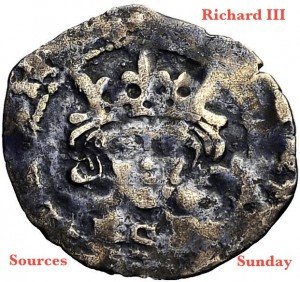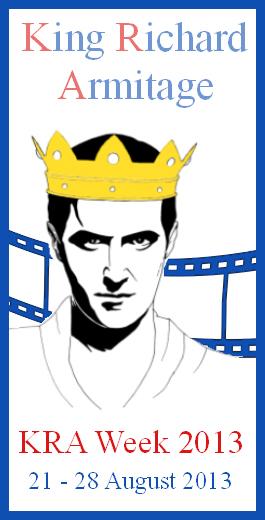Sources Sunday: Introduction
Today I’ll be starting a new feature on King Richard Armitage (to appear as regularly as I can manage), called “Sources Sunday.” In these posts, I’ll look in detail at excerpts from the sources used to write the life and times of Richard III in the last half millennium. I’ll explain their contexts and meanings, and consider the ways in which historians have understood them in the past and how we might look at them today.
***
Couple things to start off — probably elementary for most readers:
- We historians are “source geeks” and “archive rats.” Before we make claims, we like to have evidence. We get our evidence from sources. A source can be anything that we can all examine. The most frequent sources historians use are texts, documents, or material objects, or, in modern history, interviews, photographs, or films and recordings. Sometimes sources disappear entirely, or over long intervals — in those cases, we look at records of those sources as available.
- Historians conventionally divide between primary and secondary sources (although this division is not a strict one). Primary sources stem from the immediate surroundings of the events they capture and include reports by eyewitnesses, recordings, artifacts, and so on. Secondary sources, in contrast, build upon primary sources to provide their accounts of historical matters. Historians concentrate on identifying primary sources for their accounts, although they are not inherently more accurate than secondary sources.
- Ideally, a historian hopes to examine many primary sources. One of the big problems in writing a biography of Richard is that so many primary sources either never existed or have not survived, particularly those that might answer questions that interest us most, so that the first secondary sources, which were negative to Richard, became disproportionately influential.
- Comparing information from different sources allows us to come to judgment about the past. A judgment about the past is more secure, the more often it is corroborated by independent sources (ones that do not simply repeat each other’s claims). Thus we talk about and critique the transmission of particular chains of evidence from source to source. Where a source does not speak, most historians prefer to state that no conclusion can be drawn.
- No source is neutral, just as no history is neutral. Every source, every history, takes a point of view. It’s part of the historian’s job to discern and understand the source’s point of view in order to explain how that affects the information the source gives us. We call this process of assessing the reliability of a source, “source critique.”
- In order to produce a source critique, or explain how information from sources is produced and presented, working historians use a “method” or “methods”; that is, we follow particular rules for drawing conclusions from certain kinds of sources. A method is adapted to its particular kind of source (we use textual methods on texts; mathematical methods on tax records; archaeological methods on bones — and so on). Different methods, when used appropriately, can allow us to see different elements in the same sources — it’s a bit like looking at an object under a UV light vs infrared light vs normal daylight. Similarly, a method will tell us what questions cannot be answered from a particular source.
***
Finally, the point of these posts isn’t to support or refute the case for or against Richard III. Rather, it’s to try to understand the points of view held by the people most responsible for creating his reputation in the last five centuries. In understanding the sources about Richard better, we can come to understand his age and the factors that shaped him — and the people who have written about him — more effectively.







Pingback: Sources Sunday: Thomas More’s History of King Richard III | King Richard Armitage
Pingback: Richard Armitage / Richard III withdrawal? | Me + Richard Armitage